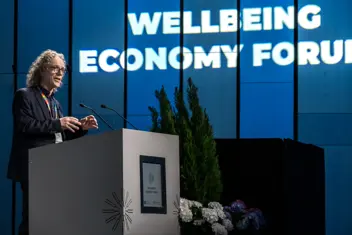On May 8–9, around 400 participants gathered at Harpa Conference Hall in Reykjavík, Iceland, for the 2025 Wellbeing Economy Forum — a dynamic and thought-provoking event that brought together policymakers, researchers, youth leaders, and advocates to explore how economies can better serve people, societies, and the planet.
The Forum, hosted by the Directorate of Health in Iceland and chaired by Dr. Dóra Guðmundsdóttir, Director of Public Health and founder of the Forum, is an integral part of the JA PreventNCD. This year’s Forum focused on the connections between economic policy, public health, and sustainable development, reinforcing how the wellbeing economy framework is not just an economic ideal but a public health imperative.
"We’ve started an important conversation about the Wellbeing Economy. After all, economies are designed by people — and if they’re not serving us, we can redesign them," said Dr. Guðmundsdóttir during the opening plenary. "Can we set measurable goals to increase happiness and wellbeing? Could that help us prioritize actions that truly improve quality of life?"
High-Level Reflections and Forward-Thinking Policy
The Forum opened with a powerful fireside conversation with pioneers of the wellbeing economy, including Stewart Wallis of the Wellbeing Economy Alliance and Ilona Kickbusch of the University of Geneva. They were joined by senior Icelandic and Scottish government officials, including Gary Gillespie, Chief Economic Adviser to the Scottish Government, and Benedikt Árnason, Permanent Secretary of the Icelandic Prime Minister’s Office.
Across two days, plenaries tackled bold questions and practical strategies: How can we embed wellbeing at the heart of economic decision-making? What indicators, tools, and frameworks are needed to support this shift? And how can we ensure that voices from across generations and sectors are heard?
A standout session was "Wellbeing is Smart Economics," chaired by Gustavo Merino of UNESCO, where speakers emphasized that countries investing in people — particularly during times of crisis — have proven more resilient. JA PreventNCD’s own Youth Advisory Group was represented on the panel by Filipa Alpeza, highlighting the value of youth participation in shaping the future. Baroness Patricia Scotland underscored this point: “Working in silos is a costly mistake. Wellbeing policies are not only humane — they’re efficient.”
From Frameworks to Action: Lessons from WEGo Governments
One of the Forum’s central themes was how to translate wellbeing concepts into practice. Plenary IV, chaired by Scotland’s Gary Gillespie, spotlighted policy innovations from WEGo (Wellbeing Economy Governments) member countries including Iceland, Finland, Wales, and Scotland.
Mariana Mazzucato, in a keynote delivered virtually, challenged participants to rethink the state’s role in shaping value, arguing for bold public missions that foster inclusive growth. Icelandic speaker Rósa Guðrún Erlingsdóttir drew inspiration from gender budgeting and bottom-up approaches that have transformed policy thinking in the Nordic region.
The Finnish delegation’s proposals were particularly well received, aligning closely with Iceland’s own experiences. Prof. Heikki Hiilamo reminded the audience: “Democracy matters. Governments must work for the people — and with the people.”

Knut-Inge Klepp, Scientific Coordinator of JA PreventNCD
Linking Health and the Economy: JA PreventNCD's Contribution
With the Forum being part of the JA PreventNCD, several people from the Joint Action played a key role and were represented both on stage and in attendance. A big part focused on the discussions around how a wellbeing economy approach can enhance public health. Scientific Coordinator Knut-Inge Klepp shared how the project emphasizes structural drivers of inequality and cross-sectoral engagement — moving beyond individual-level interventions to population-wide strategies.
“Our Joint Action is different. We focus on systemic prevention and societal determinants, aiming to reduce health inequalities at scale,” said Klepp.
A dedicated session examined how concrete policy measures and wellbeing indicators can support healthier societies, drawing on JA PreventNCD’s ongoing work in monitoring, youth engagement, and intersectoral collaboration.
At the Forum, Aurore Fransolet presented the Policy Toolbox for the Wellbeing Economy — a growing resource developed under JA PreventNCD to support policymakers with actionable instruments at all levels of governance. The Toolbox aims to map existing policies, case studies, and best practices across EU/EEA Member States, while also identifying the obstacles and levers that shape implementation of Wellbeing Economy approaches.
Speakers also stressed the importance of communication — making these complex ideas accessible to policymakers and citizens alike. This is not just about reshaping policies, but reshaping narratives. As Klepp noted, the Forum itself is a vehicle for dissemination and dialogue, aligning public health with economic and environmental agendas.

Halla Tómasdóttir, President of Iceland in conversation with Sandrine Dixson-Declève
Courage, Compassion, and the Power of Dialogue
The Forum’s closing day shifted to the human dimension of leadership and change. In a heartfelt session, President of Iceland Halla Tómasdóttir shared personal stories of courage and transformation, urging participants to lead with heart as well as mind.
“The world doesn’t need leaders with all the answers. We need leaders who ask better questions. We need to be brave enough to build bridges across generations, sectors, and perspectives,” said President Tómasdóttir.
Her dialogue with Sandrine Dixson-Declève and Dr. Jude Currivan offered a contemplative close to the Forum, complemented by youth reflections that brought urgency and hope. Silvia Grothe Riera, from the JA PreventNCD Youth Advisory Group, called for a more inclusive dialogue that acknowledges cultural and generational diversity.
Rada Dimitrova, a medical student from Bulgaria and youth representative, emphasized the importance of bringing public health and sustainability discussions to local contexts. “Back home, this is still a distant topic. But I feel inspired and ready to be part of the change,” she said.
Reflections and the Road Ahead
The final session brought together leaders from OECD, UNESCO, and civil society. Romina Boarini of OECD’s WISE Centre questioned whether our current metrics are capturing what really matters. Gabriela Ramos of UNESCO reminded the audience of the need to prove that wellbeing is not only morally sound — but economically viable.
Dr. Guðmundsdóttir closed the Forum with a call for values-based leadership: “We need more people not in love with power, but who believe in the power of love.”
She challenged education systems to teach empathy and inclusion, and institutions to connect with the public in meaningful ways. “This isn’t about a single sector or discipline. It’s about bridging silos — in academia, in government, and in our own hearts.”
Save the Date: April 16–17, 2026
Building on the momentum of this year’s Forum, we are pleased to announce that the next Wellbeing Economy Forum will take place on April 16–17, 2026, once again at the iconic Harpa Conference Hall in Reykjavík.
As part of the JA PreventNCD’s broader effort to transform how we think about public health and sustainability, the Forum continues to be a crucial space for collaboration, learning, and systems change.
Join us next year as we deepen this vital conversation — and keep building the future we all deserve.
